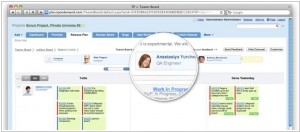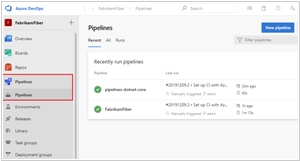Azure DevOps vs TargetProcess
July 27, 2023 | Author: Michael Stromann
3

TargetProcess is agile project management software. Designed with simplicity in mind, TargetProcess helps software development companies reduce the complexity of software project management and simplifies planning, tracking and quality assurance activities. TargetProcess supports SCRUM, XP and other agile processes. $25 per user per month
Azure DevOps and TargetProcess are two distinct platforms that serve different purposes within the software development lifecycle. Azure DevOps, developed by Microsoft, is an end-to-end application lifecycle management tool that provides a wide range of services, including version control, continuous integration and delivery, project tracking, and collaboration. It offers seamless integration with popular development tools, such as Visual Studio, and supports multiple version control systems like Git and TFS. Azure DevOps' strength lies in its ability to provide a unified platform for teams to plan, develop, test, and release software, making it a preferred choice for organizations heavily invested in Microsoft technologies.
On the other hand, TargetProcess is a visual project management and team collaboration tool that emphasizes flexibility and adaptability. Unlike Azure DevOps, which is primarily focused on software development, TargetProcess can be used for various types of projects beyond software development, such as marketing campaigns, product development, and more. It provides a highly customizable and visual approach to project management, using boards, timelines, and various other visualization tools to help teams better understand their workflow and progress. TargetProcess excels in its ability to support different project management methodologies, including Agile, Scrum, Kanban, and others, making it suitable for organizations that work on diverse projects and want to tailor their project management processes to specific needs.
Another key difference between Azure DevOps and TargetProcess is their pricing and licensing models. Azure DevOps operates on a subscription-based pricing model, with different tiers offering varying features and user limits. It also provides free options for small teams. In contrast, TargetProcess offers a user-based licensing model, where the cost is determined by the number of users accessing the platform. This can be advantageous for organizations with a limited number of users who need access to the project management tool. However, the pricing structure may become less cost-effective as the number of users increases, making Azure DevOps a potentially more budget-friendly choice for larger teams or organizations seeking an all-in-one solution for their software development needs. Ultimately, the choice between Azure DevOps and TargetProcess will depend on the specific requirements, project types, and preferences of the organization and development teams involved.
See also: Top 10 Source Code Management tools
On the other hand, TargetProcess is a visual project management and team collaboration tool that emphasizes flexibility and adaptability. Unlike Azure DevOps, which is primarily focused on software development, TargetProcess can be used for various types of projects beyond software development, such as marketing campaigns, product development, and more. It provides a highly customizable and visual approach to project management, using boards, timelines, and various other visualization tools to help teams better understand their workflow and progress. TargetProcess excels in its ability to support different project management methodologies, including Agile, Scrum, Kanban, and others, making it suitable for organizations that work on diverse projects and want to tailor their project management processes to specific needs.
Another key difference between Azure DevOps and TargetProcess is their pricing and licensing models. Azure DevOps operates on a subscription-based pricing model, with different tiers offering varying features and user limits. It also provides free options for small teams. In contrast, TargetProcess offers a user-based licensing model, where the cost is determined by the number of users accessing the platform. This can be advantageous for organizations with a limited number of users who need access to the project management tool. However, the pricing structure may become less cost-effective as the number of users increases, making Azure DevOps a potentially more budget-friendly choice for larger teams or organizations seeking an all-in-one solution for their software development needs. Ultimately, the choice between Azure DevOps and TargetProcess will depend on the specific requirements, project types, and preferences of the organization and development teams involved.
See also: Top 10 Source Code Management tools



